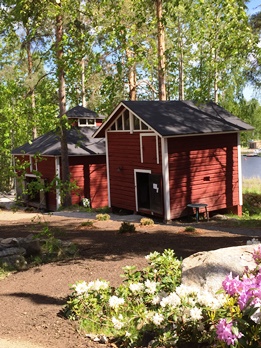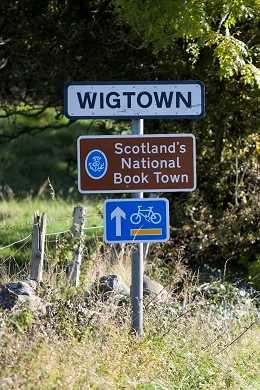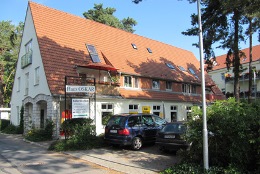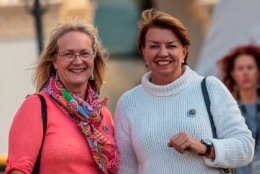Preamble
The former International Organisation of Book Towns, EEIG (European Economic Interest Grouping) was founded in Redu on the 1st of April 2001 as a result of the EU–project UR 4001 'European Book Town Network – a Telematics Application based on a Model for Sustainable Rural Development based on Cultural Heritage', in cooperation with Vestlandsforsking , Norway and Luton University, England. It was registered at the Chamber of Commerce, Arnhem, The Netherlands, under nr.091220291. The General Assembly of this Organisation decided on the 11th of September 2010 to change the legal identity of the I.O.B.
According to this decision a 'vereniging met beperkte rechtsbevoegdheid' has been founded and registered. The name of this Vereniging is, as before, International Organisation of Book Towns, alias I.O.B. The legal address is Boomkruiperlaan 7, 2566 JH Den Haag, The Netherlands.
Definition
A Book Town is a small, preferably rural, town or village in which secondhand and antiquarian bookshops are concentrated. A Book Town makes large amounts of second–hand and antiquarian books available to everyone and is one of the most successful new tourism developments, and offers an exemplary model of sustainable rural development and tourism. Meanwhile this concept is and has been followed in many countries on several continents. The bookshops are often complemented by artisanal enterprises such as paper production, calligraphy, printing, book design, book illustration and traditional bookbinding, as well as other crafts which are not related to books.
Aims
The aims of this International Organisation are to:–
- raise public awareness of book towns and stimulate interest by giving information on the internet and by organizing an International Booktown Festival every second year;
- enhance the quality of book towns by sharing knowledge, skills and know–how between the book towns and their individual book sellers and other businesses;
- strengthen the rural economy by promoting the existing book towns;
- undertake other activities which can serve the interests of book towns and strengthen independent businesses in book towns;
- help in these ways to maintain regional, national and international cultural heritage and to stimulate the international public awareness.
Members
Members of the Organisation can be associations, organisations, local governments, businesses and individuals in book towns.
A resolution to admit new members is to be passed by the members of The Organisation.
If a member seriously fails in his obligations, or causes or threatens to cause serious disruption to the operation of the Organisation, his membership shall be terminated.
Membership Fee
To become a member it is required that an 'entrance fee' is paid. Each year after the first year an annual membership fee has to be paid. The fee is decided by the General Assembly.
The fees are:–
| Entrance Fee | Annual Fee | |
| Towns, municipalities and organisations | €250 | €75 |
| Individual Members | €100 | €30 |
The annual fee is paid at the beginning of each year for the membership to be valid that year. To be considered as a member at the General Assembly, the fee must be paid at the latest one month before the General Assembly meeting. If a member fails to pay the annual fee, the member is excluded from the Organisation. To enter as a member again, a new entrance fee has to be paid.
The I.O.B. also offers the possibility of a prospective membership for beginning book towns. Prospective members will receive the same information as other members, but they will not be invited to the General Assembly. If they want to visit an International Festival, they can do so at their own expenses. The annual contribution for a prospective member will be 25 euros.
Organisation
The Organisation is governed by the General Assembly. The General Assembly consists of all members of the organisation.
Towns, municipalities and organisations have five votes, individual members have one vote.
A 75% majority decision by the members shall be required to:–
- alter the objects of the organisation;
- alter the number of votes allotted to each member; ;
- alter the conditions for the taking of decisions;
- alter contributions to the organisation's financing;
- transfer the official address of the organisation;
- admit new members;
- terminate the membership if a member seriously fails in his obligations or causes or threatens to cause serious disruption to the operation of the Organisation.
All other decisions shall be taken under the following quorum and majority conditions:–
- The meeting may deliberate validly only if at least half of the members, representing at least half of the votes, is present or represented.
- Decisions shall be taken by a simple majority of the votes of members present or represented.
The members may also pass resolutions without holding a meeting, provided that the majority of votes referred to in the preceding phrases of this article are achieved and provided that it is done by post or by e–mail, and provided that all members have been consulted.
The General Assembly meets at least once every two year.
Board
The General Assembly elects a board of three managers, and one deputy manager, each for a two year period. If possible, one of the managers should be from the book town hosting the next General Assembly during an International Book Town Festival. The board elects a president from among the managers. The term of office for the president is one or two years. For the period of a year preceding the General Assembly, the president should be from the hosting book town, if possible. The deputy manager will be in function when one of the managers quits the board.
The board is responsible for work carried out within The Organisation, for representing The Organisation and for the accounts.
The board prepares a statement of activity and finances for the General Assembly.
Activities
The Organisation owns and runs a website. The website should present all member booktowns, individual members and prospective members.
The International Organisation can arrange book fairs, festivals, seminars or any other book related activity. Such activity can also be organised by any of the members, but needs the approval of the board for the activity to be considered an activity of The Organisation.

 Tvedestrand
Tvedestrand
 Sysmä
Sysmä
 Sedbergh
Sedbergh
 Wigtown
Wigtown
 Featherston
Featherston
 Wünsdorf
Wünsdorf
 Clunes
Clunes